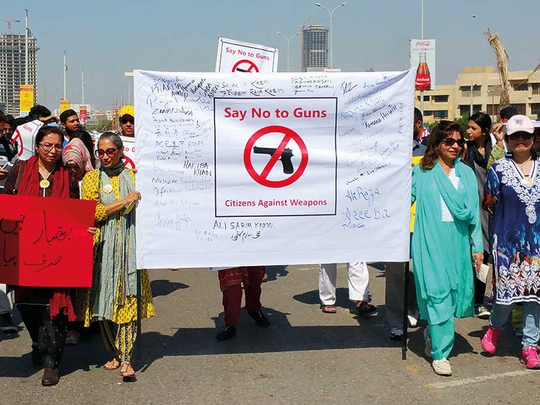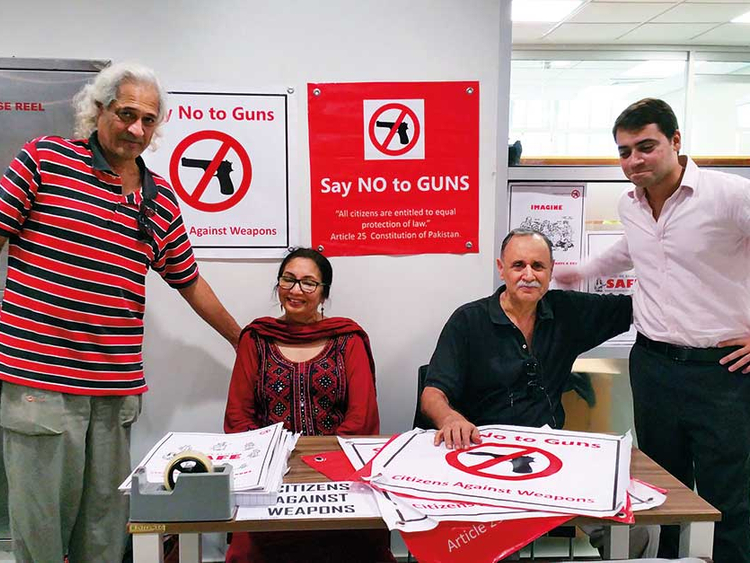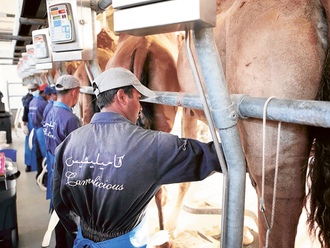
Security analysts often point to militant ideology and politics to explain the roots of terrorism in Pakistan. But one factor which tends to gets significantly overlooked is the mass proliferation of weapons in the country.
“That is our main point,” says Naeem Sadiq, a leading campaigner against weapons proliferation in the country. “We have been saying that a weapon is a fundamental instrument of violence. When you are talking of violence, you are spending a lot of breath and hot air without actually addressing the instrument which is causing it. So, first remove that instrument of violence and everything will become better.”
A health and safety engineer, Sadiq has worked in many areas of government reform for ordinary people. He is also a vocal member of Citizens Against Weapons (CAW), a civil society group working towards de-weaponisation in Pakistan. “I am essentially a volunteer,” he says. “A private citizen with no association or linkage with any group, NGO or anything.”
The proliferation of weapons in the country starts from the top. It is a little known fact that Pakistan’s parliament is alleged to be the most weaponised in the world. “No parliament has 69,473 prohibited bore gun licences,” says Sadiq. “It is very shameful. These are the people who have gone there to make peace and progress, and the first thing they do is to get hold of licences. What a shameful thing. This is an official figure admitted by the parliament itself.”
Sadiq sees discrimination in having such a heavy concentration of weapons in the hands of a select few: “This is a huge number for a parliament,” he says. “It means every member [of parliament] has a few dozen bore gun licences. But your gardener or your cleaning person will not have a gun licence. He will never be able to get it. Only people in power get it. So it is a power game in Pakistan.” Prohibited bore includes AK-47s and sub-machine guns. “Prohibited bore is by definition prohibited. So therefore there should be no reason to give licence for it. That itself is a terrible practise.”
At least half a dozen of Sadiq’s friends have fallen victim to gun crime. One was Zahra Shahid Hussain, the senior vice-president of Pakistan’s Movement for Justice party (PTI) led by former international cricketer Imran Khan, who was shot dead by gunmen on motorcycles in front of her home in Karachi in May 2013. “She was a dear friend of ours for many years. For no rhyme or reason, a perfectly peaceful, civilised, happy person to have been shot just because she was in a certain political party, and obviously the opponents did it. And those were the days they were doing it left, right and centre.”
Sadiq was once a gun-owner himself. He had inherited the weapon from his parents which he kept in his house as a decorativw item for many years. When he began to seriously work on the issue of getting rid of weapons, he thought he shouldn’t hold even a licensed gun, although it was handed down by his family.
So he went to a police station to surrender his gun. “There was a big debate,” he recalls. “He [the police officer] said why are you returning it? It is your gun and you have a licence. I said no we believe that no one should have a gun — licensed or otherwise. So with some difficulty I returned it. I shouldn’t say returned but I deposited that gun forever in a police station nearby.”
Many argue that the right to bear arms is akin to a right to self-defence. On December 16, 2014, militants attacked the Army Public School in Peshawar leaving more than 140 dead. After this incident there was a drive to arm schools. “That came as a foolish knee-jerk reaction because we quickly figured out that even if every school has two guards with weapons standing outside, they actually cannot stop an armed group of 10 people with weapons coming in,” says Sadiq.
There was even a call for teachers to carry weapons. This was especially the case in the north west province of Khyber Pakhtunkhwa after the Peshawar attack. “Not only teachers, the lawyers said we need weapons, then the doctors said we need weapons. And then every professional said we need weapons. So really what it means is that every person should have a weapon.”
In Pakistan, security guards have been hired to protect schools. “The government kind of insisted that everybody should have some arrangement. That is really a kind of facade. There is a sleepy looking old fellow with a gun he has never used standing lazily in front of some school. So there is hardly any point of having him or not having him there.”
Sadiq calls for a pre-emptive strategy of weapons removal. “Weapons are essentially a marketing, profiteering methodology by a group of people and these people are those who sell weapons. These are those who are in the business of security companies. These are those who are in the business of manufacturing. These are like the National Rifle Association (NRA) of USA, which is the greatest champion of weapons. So having guards in schools is a NRA approach.”
The gun debate in the United States is the one most widely covered by the media. Sadiq says there is a huge difference between Pakistan and US. “The constitution of the United States allows people to carry weapons. Not only allows, but it has declared it as a right to bear weapons. The constitution of Pakistan has no such requirement. In fact the issuing of gun licences in Pakistan is discretionary. It is to say that if the deputy commissioner would agree to your request he could give you [the licence], and if he doesn’t, then you could do nothing about it.”
In theory then it should be simple to get rid of weapons in Pakistan. “If today the government wants, it can just stand up and say every weapon [licence is] declared null and void and we shall buy back and we shall be a weapon-free society. And technically they can do that today. Can you see the difference between us and the USA? In the USA they cannot do that.”
There are examples of countries where the use of weapons is not so widespread. “In the UK even the police does not carry weapons. So what has the UK done? They have done nothing except to take away weapons. So now if somebody has to kill somebody they have to use a knife. Or acid more recently. So that is what any civilised society needs to do. Japan has done it. Australia is doing much of this now.”
There is a direct corelation between the number of weapons in a society and the number of killings that take place, says Sadiq. “In Pakistan, roughly 20 million guns are in the hands of civilians. Out of these 80 per cent are unlicensed. And 20 per cent are licenced. But those which are licensed are almost fraudulently licensed because those licences are given on the basis of friendship, patronage, bribe, selling … Sometimes they are given en-block. Okay, you are my friend, I will give you 50 licences.”
The proliferation of weapons weakens the authority of the state. “We found that people have acquired weapons and made groups like private militias and they challenge the writ of the state, and the state began to recede. Last year there was a Choto Gang in the province of Punjab, which the police simply could not tackle because they would capture policemen or kill them. So the army had to be called in and a major operation had to be launched.”
Among the demands put forward by Citizens Against Weapons (CAW) is the application of Article 256 of Pakistan’s constitution which requires all private militias, regardless of their patrons, to be completely disarmed and disbanded. “Every weapon in Pakistan in the hands of any private citizen should be declared null and void weapon or illegal weapon. The state should make arrangements to buy them back. Like buyback arrangements have been made by Australia, UK [and] many countries who have removed weapons from their societies.”
A change in the attitude towards the ready availability of weapons in Pakistan is needed at the very top. Sadiq welcomed recent remarks by Prime Minister Shahid Khaqan Abbasi towards getting rid of illegal weapons. At the same time he remains sceptical. “In the past 10 years we have heard at least 20 major announcements by the government that they would want to de-weaponise,” says Sadiq. “But never has it actually been done. And we continue to see the issuance of licences and the growth of weapons.”
Syed Hamad Ali is a writer based in London.













